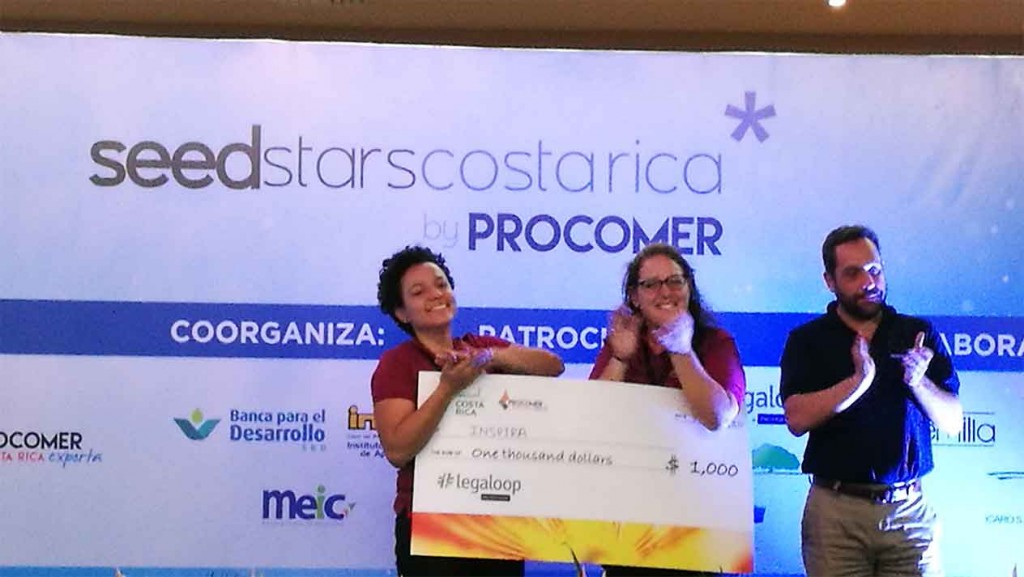EARTH team wins regional semifinals of Seedstars entrepreneurial competition
Last week, the Caribbean region’s Seedstars Costa Rica competition took place. The event – organized by PROCOMER, a public agency that promotes Costa Rican exports – saw EARTH students Darling Blanco (‘18, Costa Rica) and Maddalena Bettoni (‘18, Italy) named winners in the entrepreneurship category.
The duo’s project, called INSPIRA, aims to strengthen business social responsibility processes by marketing sustainable development bonds and acting as intermediaries between client companies and developing communities – an arrangement that mutually benefits both parties.

Darling and Maddalena receiving their award on June 29, at Hotel Suerre in Guápiles, Limón, Costa Rica. (Photo: Irene Alvarado)
According to Darling and Maddalena, “Different economic schools of thought promote a business’s economic growth as the only way to be successful, and leave nature and communities out of this growth.
Nevertheless, in the last few years, businesses have begun to understand that being successful requires accounting for the true costs of doing business. This has led them to implement community programs and projects that add value to the areas in which they’re based.
On the other hand, many communities experience an absence of guidance and resources necessary for effective promotion of development from a sustainable perspective. INSPIRA finds a space to create solutions of shared value between business and community.
Businesses require efficient, concrete ways of exercising social responsibility. It’s even better if such efforts can be accompanied by a certification that differentiates the participating business in the market and promotes pride internally, within the company. The purchase of sustainable development bonds facilitates this process for businesses and is an option for any interested community.
The community that decides to join the network can implement a business that generates value in its development process, so the company assumes a shared responsibility of guiding community development. Such an investment has a return of capital over time and inspires good word of mouth.
Maddalena chatted some more with us about her partner project INSPIRA. Click this drop-down menu to read the full conversation.What motivated you and Darling to start INSPIRA?
INSPIRA was born from our concern for sustainability and the great need that exists for social development. At first there were a lot of ideas, but we were able to narrow them down by working with Fabián Campos of EARTH’s Permanent Education Program. He’s been our mentor and, having been very involved in the subject, has given us incredible guidance.
In your own words, what is your project about?
It’s the creation of a practical system for businesses to fulfill their corporate social responsibility through the purchase of sustainable development bonds. We would obtain these bonds through measuring the development within the project’s participating communities, and, with the money obtained, that level of development would continue deepening.
What’s Seedstars?
Sponsored by PROCOMER, it’s the largest entrepreneurship and innovation competition in the Caribbean zone of Costa Rica. The winners of the regional qualifying round receive U.S. $1000 and the opportunity to participate at the national level, where the grand prize is U.S. $55,000.
Why’d you choose to participate in Seedstars?
At first we were only going to participate at the institutional level, but for the chance to participate in an event of such importance, we took the risk and registered. We didn’t have high expectations, but, as we progressed, we realized our proposed idea was being well received by the public.
What recommendations for improvement did you receive?
One of the jury’s concerns was that our idea didn’t involve companies in the process of sustainable development. Since then, we have modified several things so they are more directly connected to that process.
What have you learned from the experience?
From the time we started until we finished forming the idea, we were very excited and have learned we really want to put this idea into practice once we graduate. With Fabián’s help, we know it’ll be easier. In the Seedstars finale on September 19, we’d like to include him formally in the project because we wouldn’t have been able to do it without him. The most enriching takeaway for us has been that hard work is rewarded. With effort and persistence, anything is possible.
Other projects
In addition to INSPIRA, five other EARTH teams participated in the qualifying rounds. They are:
- Plantain chip making in the Bri Bri indigenous community – Edwin Estrella (‘18, Ecuador).
- Hemp brick production for the construction of houses for low-income and homeless families – David Torres (‘18, Ecuador).
- CSA-style commercialization via regular, contracted delivery of local products from producer to final consumer – MasterCard Foundation Scholars Johana Carmona (‘17, Colombia) and Carolina Aguilar (‘17, Costa Rica).
- Sustainable production of microalgae – MasterCard Foundation Scholar Juliet Araníbar (‘18, Peru).
- Green energy-powered desalinization of drinking water – Jhoselyn Mendoza (‘17, Ecuador) and Kalem García (‘17, Ecuador).
Innovation and Sustainability Fair
Each year, the Innovation and Sustainability Fair is held at EARTH. The event aims to support the extracurricular business initiatives of third-year students, who present their innovation proposals and attempt to attract partners, investors or financing for their ventures.
The projects chosen in the Fair become finalists for the Sustainability Prize. The following projects will compete for the Sustainability Prize, worth U.S. $10,000:
- CUÑATAI: Value-added operations by women of low resources in rural Bolivia – Elia Romero (‘18, Bolivia) and María Nohelia Rojas (‘18, Bolivia).
- Poultry production through agroforestry – Raphaël Loubert (‘18, Belgium) and Mariana da Cruz Albertazzi (‘18, Costa Rica).
- INSPIRA (mentioned above)
- Seawater desalinization for agricultural use – Marc Présumé (‘18, Haiti).
- Creation a small business of products derived from coffee – Noemi Vásquez Bajurdo (‘18, Honduras).
- Kore Ti Plante: Compost production using organic wastes from Ouanaminthe families – Franco Gustave (‘18, Haiti) and Budji Toussaint (‘18, Haiti).
This prize and its seed funding are bestowed at their graduation in December 2019.




